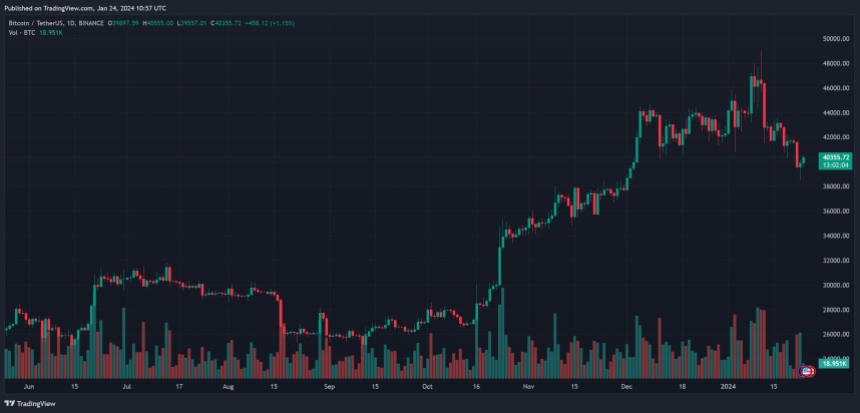
The Bitcoin network and its underlying assets have evolved since its launch in 2009, and keeping up with the changes and updates can be challenging. In a post, financial strategist Lyn Alden broke down five key metrics to help BTC investors assess the network’s current state.
Beyond Price: A Look At The Bitcoin Network Vitality
As Lyn Alden suggests, a deeper dive into the Bitcoin network is essential for any investor. This approach offers a more nuanced understanding of Bitcoin’s status, moving past the “superficialities of price fluctuations” to gauge its true potential and challenges.
Alden claims that price may not capture the complete story but remains a critical signal of adoption and market positioning. Bitcoin competes not just with other cryptocurrencies but also with traditional assets like gold and fiat currencies.
Its fluctuating price reflects its relative youth and volatility compared to more established currencies. However, its fixed supply of 21 million Bitcoin provides an alternative to the constantly inflated supply of fiat currencies, such as the US dollar. The analyst stated:
The Bitcoin network itself might be serving as a heartbeat of clockwork order in a world of chaos, but price is nonetheless a measure of its adoption.
Bitcoin has consistently shown an upward trend, historically making it one of the best-performing assets, as seen in the chart below. The uptrend in the BTC price shows that the project has successfully operated as an alternative to traditional forms of money.
A key aspect to consider is liquidity – how much daily trading volume occurs and how much transaction value is circulated on-chain. High liquidity indicates a robust, widely used network. On the latter, Alden pointed out:
(…) now that bitcoin has billions of dollars of trading volume, there are trillion-dollar pools of capital that can’t put meaningful percentages into it; it’s still too small and illiquid for them. If they start putting a few hundred million dollars or a couple billions of dollars per day into it, that’s enough to tilt the supply/demand toward the buy side and seriously inflect the price upward. Since inception, the Bitcoin ecosystem has had to achieve certain levels of liquidity before it even gets on the radar of bigger pools of capital. It’s like leveling up.
The narrative surrounding Bitcoin is ever-evolving. It’s been viewed as both a payment method and a savings tool, reflecting its multifaceted utility. The balance between these functions – being able to execute transactions globally while serving as a reliable store of value – is vital.
The growing number of conversion points, where Bitcoin can be exchanged for goods, services, or fiat currencies, plays a crucial role in its adoption and practical use.
Bitcoin’s fundamental value proposition lies in its security and decentralization. The network must remain resilient against attacks and maintain its decentralized nature to continue being a credible and valuable digital asset. Despite facing technical challenges and bugs in its history, Bitcoin has demonstrated remarkable robustness, maintaining 100% uptime since 2013.

What About The Bitcoin User?
As Bitcoin evolves, so does the ease of its use. Developing user-friendly hardware wallets, improved software interfaces, and increased Bitcoin ATMs have significantly enhanced the user experience. This evolution is critical for Bitcoin’s wider adoption beyond tech-savvy individuals to the general public.
On this key metric, Alden points to the progress in BTC hardware wallets, which allow people to store their private keys while maintaining the usability of their coins. Setting up a BTC wallet is becoming easier and will likely continue moving in that direction.
The legal landscape surrounding Bitcoin varies significantly across different jurisdictions. While some governments have embraced it, others remain skeptical. However, Bitcoin’s global nature offers a kind of resilience to localized regulatory challenges. Its decentralized nature makes it a formidable entity to regulate or ban effectively.
In conclusion, while challenges in miner decentralization and user experience persist, the overall trend is positive. Alden believes the network continues to grow in liquidity, technical robustness, and global acceptance.
For investors and enthusiasts alike, Bitcoin remains a “dynamic and promising field, ripe with opportunities for growth and innovation.” As Alden points out, Bitcoin’s open-source nature invites continuous refinement and enhancement, making it a “resilient and adaptive digital asset.”
Cover image from Unsplash, chart from Tradingview
Disclaimer: The article is provided for educational purposes only. It does not represent the opinions of NewsBTC on whether to buy, sell or hold any investments and naturally investing carries risks. You are advised to conduct your own research before making any investment decisions. Use information provided on this website entirely at your own risk.

Leave a Reply